
Book Reviews: November 2012
Doll Studies: Forensics, Prose poetry by Carol Guess
What Dread, Poetry by Zilka Joseph
Shampoo Horns, Flash Fiction by Aaron Teel
Priors, Stories by Marcel Jolley
Percussion Grenade, Poetry by Joyelle McSweeney
The Pilot House, Poetry by David Rigsbee
My Call to the Ring: A Memoir of a Girl Who Yearns to Box, Memoir by Deirdre Gogarty, with Darrelyn Saloom
The Branches, The Axe, The Missing, Poetry by Charlotte Pence
fff
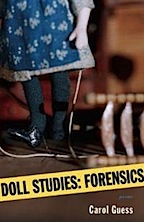 Doll Studies: Forensics
Doll Studies: Forensics
Prose poetry by Carol Guess
Black Lawrence Press, 2012
ISBN-13: 978-1936873166
$14.00; 84pp.
Reviewed by Renée K. Nicholson
When a book has a source of inspiration, as is the case with Doll Studies: Forensics by Carol Guess, it can be too easy to rely on that inspiration to interpret the poems. Guess used photographs of crime scene dioramas collected into a book, which she credits in her notes at the end of the collection. However, these prose poems transcend her source of inspiration, and the book works on a level beyond the dioramas—one does not have to be familiar with them to understand and be brought into the moment of these pieces.
The prose poems do have a snapshot quality, and the use of the word “forensics” in the title is telling in how to read these snapshots: gathering evidence to support fact. The facts that Guess reveals to us are emotional rather than simply crime-scene related, although she uses the language of a crime scene to heighten this sense. For instance, “Box Factory” starts with “Spatter tells a story best read by day, headline array and angles.” Later, in “Girl on Wheels,” the crime scene language appears again as it will throughout the book. “The idea is not to solve the crime. Color and texture form the prelude to meaning. The idea is to see as at a museum.” While Guess doesn’t pigeonhole the language of investigation, she plays with the words and diction, stacking up our expectation as readers to fit together evidence that reveals the underlying humanity of each piece, the way one might look at a photograph of people and try to discern something about them or about their lives in that captured moment.
Although she invokes the investigative rhetoric throughout poems in this collection, Guess also presents very domestic images. An example is “The Lieutenant’s Wife Keeps Dinner Warm,” which invokes both the domestic and the violent together. “Lettuce hangs its head in the icebox. Ice cream melts, sweet rotten teeth.” Later, in the same poem, “This isn’t a lullaby but facts stacked like dishes.” In poems like this one, Guess masterfully intersects the domestic—food items and cleaned dishes—with the near-violent—hanging of heads and sweet rotten teeth. The violence is not overt, but pulled back and settled in, like a crime scene might be, with clues and dead ends, with questions more than answers.
Guess also leaves us clues in the form of crime scene language. In “Cake With Corpse” she says, “a story not in words, but things,” and other poems show us the stuff of the victims’ lives—“lovely appliances—gleaming and crumb-less” and “Dick’s wedding photo […] beside a pocket watch and Lucky Strikes” hint of the lives that acquired these things. The poems betray curiosity, a nagging sense of wanting but never knowing more. Perhaps Guess herself initiates us into her way of interrogating through “Tenth Seminar In Homicide Investigation,” which comes late in the book and instructs, “your job at a crime scene is simply to see.” Sage advice for how to take in these, or, perhaps, any poems as a process of witness. Not to see would be the real crime.
 What Dread
What Dread
Poetry by Zilka Joseph
Finishing Line Press, 2012
ISBN-13: 978-1599248516
$12.00; 20pp.
Reviewed by Dani Burlison
Zilka Joseph’s latest chapbook of poetry, What Dread, invokes the wild in us all. A collection of ballads to the untamed, instinctive, and emotional all at once, Joseph merges the feral with the insightful and delivers poetry that gently wakens some formerly uncharted territory of the psyche. There is something primordial and raw about Joseph’s words, as if invoking an ancient magic from the center of the earth itself.
Her opening poem, “Wild Muse,” draws the reader into the depths Joseph explores in the twenty short pages that follow:
The poet who wanders the forests of my heart
lives in the curls and double helices,
sings by Promethian fire,
has sprung from gods, or stars…
And “Black-Eyed Susan” conjures images of loss and rebirth:
Back she breaks
through swamp and mud,
and her black eyes shine
holding secrets
as dark as the sky.
Like all her once bright-faced sisters
now crushed by boot heels…
Every word in this collection is rich with the kind of reverence or emotion one usually finds submerged in the ocean or strolling through a cool, dark forest. Joseph has a way of inviting the reader inside of the self while simultaneously transporting into another world. What Dread is a collection to read over and over again—every poem offers a new and distinct awe each time the book is opened.
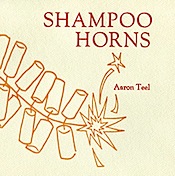 Shampoo Horns
Shampoo Horns
Flash Fiction by Aaron Teel
Rose Metal Press, 2012
ISBN-13: 978-0984616657
$12.00; 64pp.
Reviewed by Stephanie Barbé Hammer
One of the continuing pleasures of American fiction is its ability to focus on the small in the midst of the gargantuan space that constitutes the variegated U.S. landscape. Huckleberry Finn manages to be at once national and local—grounded, mired, one might even say, in a specific place. This ability to manifest the national while sinking toes into the local applies to such writers as Aimee Bender, Annie Proulx, Phillip Roth, and Richard Russo. They feel American to us, because they are enmeshed in a particular space that is so uniquely and clearly home to their characters.
The nested boxes of an empire that lies within the small that lies within the big is the subject of Aaron Teel’s flash fiction collection Shampoo Horns, which focuses on a trailer park in a good-for-nothing town in the sprawling state of Texas. Told from the point of view of a boy-narrator in what may or may not be an accurate reminiscence, the collection begins as a series of portraits. Teel’s collection then gradually travels from trailer to trailer, looking through miniscule doors, and open windows, in acts of surreptitious watching that grow increasingly dangerous and compelling. The danger comes to us, thanks to the arrival of Clay, an older boy, who may or may not be the narrator’s actual relative, and who brings a welcome tension to the proceedings. Oddly charismatic despite or because of his abilities as a bully, Clay ups the ante on the narrator’s childhood adventures, which culminate in an act of betrayal and an act of violence; Teel explains these belatedly by reversing the temporal order of the narrative presentation. Through this move, we discover only later that a particularly terrible scene of torture occurs right before the culminating events. All this is told with a terse, understated lyricism:
“You’re a thunofabitch,” he shouted, “just like your asshole brother.” I felt a white-hot rush of pride mixed with shame, but I couldn’t think of how to respond so I didn’t say anything.”
The relationship between the boys is complicated and rewarding to read about—fueled by abuse and an uncomfortable mutual fascination. This dark relationship drives the reader through the small stories of this collection, which erupts—literally—in a final, destructive tornado.
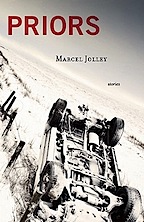 Priors
Priors
Stories by Marcel Jolley
Black Lawrence Press, 2012
ISBN-13: 978-1936873197
$16.00; 108pp.
Reviewed by Lori A. May
There are just five worlds we enter—with four shorts and one novella—in Jolley’s collection, yet the people and places found within are larger than life. Northwestern settings dominate, often in small-town Alaska, though a brief sojourn sees one cast in the land of the Chupacabra. Sense of place is integral to these stories, yet even Jolley’s Alaskan natives are taken out of comfort zones when traveling further up the map to “some distant place.”
First-person narrators often speak of Outside, the named other and the world beyond town limits where “south” means Portland or Seattle. Sure, geography dictates the setting, but it’s Jolley’s detailed eye that invites us to places like “where the Yukon River wrapped a sly arm around Whitehorse’s lower back.”
Priors reveals just as much about physical place as it does about the characters’ sense of personal displacement, caught between the self, the inside/outside world of the other, and where isolation is met by a sense of understood community only small-town folks can testify exists. At its heart, the people we come to know in Jolley’s collection share a universal discomfort in one’s own skin, battling satisfaction between what we want and what we have.
A part-time son reflects on fatherhood and marriage. An awkward young man wrestles with the desire for his more experienced friend; cruise ship staff members hook up and cross the Yukon border, where the nearest convenience store is sixty-five miles from home. All affairs—romantic and otherwise—are that much more difficult in a small town where everyone knows your name and business.
Even without the mystic setting, Jolley’s collection is an inviting purview of small-town ambition, triumph, and defeat. The lives shared within are complex and layered, yet easy to penetrate for the author’s precision with detail and characterization. In Priors, Jolley makes the familiar unfamiliar, the unknown a little more intimate.
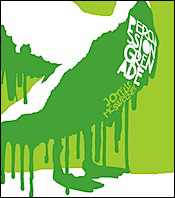 Percussion Grenade
Percussion Grenade
Poetry by Joyelle McSweeney
FENCE Books, 2012
ISBN-13: 978-1934200520
$15.95; 119pp.
Reviewed by Michael Martin Shea
Joyelle McSweeney’s status as one of our leading public intellectuals, at least on the avant-garde circuit, has consistently grown since she broke onto the scene in the early 2000s, and her newest book, Percussion Grenade, only furthers that legacy. Building on the ever-expanding sense of cultural studies she’s developed in-part with the Montevidayo crew (a loose collection of artists coalesced around a blog of the same name), and representing an almost-complete departure from her proto-Elliptical first book, Percussion Grenade is an expansive, maximalist study of a body possessed by a language that is in turns violent, fragmented, and empty.
From the book’s strange opening—“Indications,” which begins with a request for the work to be read aloud and ends with a Looney-Tunes-pastiche of head trauma—we are thrown into a poetics of performance, inscribed on a cartoonish world that bears an unsettling likeness to our own. Where The Red Bird was elusive and The Commandrine and Other Poems was cryptic, Percussion Grenade is in-your-face, bombastic, unconcerned with decorum, and McSweeney’s tonal dexterity is on full display as she careens across registers, sometimes dropping them entirely in favor of outright shrieks. The title takes on a central importance, not only by identifying language as a system of sound as well as sense, but by indicating the way it can be used as a weapon, releasing bits of shrapnel that pierce the speaker’s consciousness, as in “Killzone2,” in which the language of first-person shooters has been fully internalized: “I take a bullet / For every member of my team / A learned violence from the game of the year.”
This idea of possession is central to McSweeney’s vision, a view of the body as both active subject and passive meat that, rather than indulging dualistic tendencies, asserts this contradiction as a key to existence. Yet rather than simply parroting back the language that infects it, the speaker of these poems poses an ethical dilemma—“Is it okay to live inside this percussion grenade?” To that end, the book doesn’t pose a clear answer, save the repetition of “It’s Okay” in the titular poem, which feels more like self-assurance than a definitive moral judgment. Instead, the text constitutes a suspension of morality, an exploration of what this percussion grenade is, placing the onus of judgment on the reader, though McSweeney suggests that, given the impossibility of an escape from language, the question itself is meaningless:
if there’s a silver lining to this now it’s
nothing
if the people can see the problems in the nation now
nothing
if starting over will mean a brand new order then
nothing.
In the process, McSweeney engages in—well, would this review suffer if I introduce the phrase “culture-fucking”? Is there any other way to describe how McSweeney violently dismantles and then reassembles pieces of popular media—most notably in The Contagious Knives, the quasi-play/“Necropastoral farce” which anchors the text and stars, among others, Wikileaks’ Bradley Manning, Abu Ghraib’s Lynndie England, and Narcissus? This idea of the Necropastoral, which McSweeney has written about extensively elsewhere, combines the historic (and, in her view, fabricated) idea of pastoral verse with an encroaching sense of mortality or post-mortality: death functions not as a limit to corporeal existence, but as a central and constant process with which we are always engaged. The Necropastoral is a radical subversion of the pastoral’s faux-simplicity, revealing the sense of horror that lies at its core, and The Contagious Knives is the most violent example of this need to “make all that’s visible / turn inside out and show its bloody side.”
Though not without its own sense of lyricism (especially the Hanniography sequene), Percussion Grenade is a difficult book, and not always an enjoyable read: sometimes droning, sometimes purposefully standoffish, sometimes purposefully over-the-top. But these characteristics are necessitated by McSweeney’s project, and what they reveal about language—that it can bore you to death just as easily as it can flay you alive—are wholly important not only within the framework of the book, but for our culture at-large.
At the same time, it’s hard not to wonder where to go from here—to wonder if McSweeney’s book represents a high-water mark on the current period-style already demonstrated in poets like Lara Glenum and Chelsea Minnis. A book this good—and this weird—will surely spawn imitators. But in a sense, it feels limited. McSweeney has fully exploded the lexicon, revealed the underbelly, the anus, the vulva. The blood is on the table. Okay—what’s next?
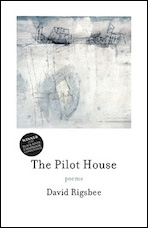 The Pilot House
The Pilot House
Poetry by David Rigsbee
ISBN-13: 978-0981589954
Black Lawrence Press, 2011
$9.00; 43pp.
Reviewed by Doug Ramspeck
It is unavoidable, perhaps, that someone gazing up at the pilot house of a great ship might interpret the sight in human terms. Here, we might imagine, is the cognitive locus of the vessel, the windows of its eyes behind which the brain watches and analyzes. Here is a certain distance from the earth or sea, the brain kept separate from the body, even, of course, when such separations are more of an illusion than reality.
David Rigsbee is the author of many books—full-length collections of poetry, chapbooks, translations, and prose—and in The Pilot House, winner of the Black River Chapbook Poetry Competition, he offers a series of mostly short poems from that cerebral vantage point of the pilot house. The works may start in the world but move quickly into stream-of-consciousness flights and shifts, leaping through associative connections that exist on that liminal edge between that which the reader might access and that which is so personal and idiosyncratic, it lies just beyond our following. The poems, then, feel at all times deeply personal and interior, regardless of the topic or whether they are in first- or third-person.
In the title poem, for example, the poet begins in a localized moment of time—the sounds of a hammer down the road, a daughter at a computer, a morning paper—then moves us through the speaker’s associations to the memory of a distant friend (Teresa Greenberg), the Six Day War, Moshe Dayan’s eye patch, and finally an oil tanker that
steams by, the tall pilot house seeming
to inspect the trees, then sending smoke
into the low clouds, before sailing on
to the mountaintops beyond the treetops.
Many of these thoughtful and accomplished works contain complex meditations on art, music, poetry, movies, and, of course, the personal; and in the most moving poems in the collection, ones like “Mastectomy,” the poet makes masterful use of the brain’s associative powers to engage our hearts—even from the heights of a pilot house.
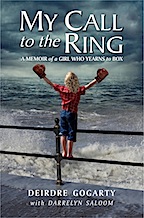 My Call to the Ring: A Memoir of a Girl Who Yearns to Box
My Call to the Ring: A Memoir of a Girl Who Yearns to Box
Memoir by Deirdre Gogarty, with Darrelyn Saloom
Glasnevin Publishing, 2012
ISBN-13: 978-1908689047
$20.00; 228pp.
Reviewed by Joe Ponepinto
Deirdre Gogarty was so obsessed with the sport of boxing, that when she couldn’t find bouts in her native Ireland, she traveled to London. When she couldn’t fight there, she flew to the United States. Gogarty’s memoir offers a perspective from inside the boxer’s world of incessant training and fight night savagery, made more curious because this is women’s boxing—a sport banned in many countries and scorned even where sanctioned.
The moralizing of boxing’s establishment, which made it impossible for Gogarty to compete in her home country, is mentioned but largely dismissed as archaic, sexist discrimination. That, and the fact that women’s professional boxing is, at the time of her participation, a new sport and suffers from a talent pool and regulation even more wanting than the men’s division, never dissuades her from the goal of becoming a champion.
The girl seems born wanting to box, idolizing not pop stars but pugilists, secretly setting up a heavy bag made of old clothes, rags, and newspapers on which to practice and vent her frustrations over family. Perhaps the marital tensions on display during her childhood helped drive Gogarty into the ring. Her story is deftly woven into a life that, apart from her passion, reads much like those of many young women from difficult family situations—her alcoholic, philandering father builds himself an apartment and moves into it; her mother, already showing signs of mental troubles, recedes into depression and is hospitalized; brothers and sisters go off to live their own lives, at one point leaving teenage Deirdre alone in the family’s house to fend for herself. On her own, she rides her bike to work, and pedals several days a week to the local gym, where sympathetic trainers, impressed by her perseverance, let her work out with the men, even allowing her to spar with heavyweights. Getting fights against women, however, proves much tougher. Along the way she endures traditional biases against women boxers, and the indignity of “promoters” who instead offer her bouts in topless exhibitions and mudwrestling.
Gogarty’s life takes two tracks. Inside the ring, she learns punching technique, footwork, and how to defend. Outside, she falls in love with a graphic design student named Gavin. But when the call finally comes to go to America to try to make a name for herself as a boxer, the decision is easy. The promises of a traditional life as a wife and working woman can’t compare to the thrill of the ring. She lands in Louisiana, into the rough care of promoter Beau Williford and his long-suffering wife, Teri. In the states, she trains harder, gets some bouts, and endures a sometimes exhilarating, but often miserable, existence in a cheap apartment and with a dreary job. Carless, biking to and from work, she trains in the steam of the Louisiana bayou.
Her story, told from within her obsession, is filled with graphic, round-by-round details. It has its share of defeat and self-doubt, but is understandably short on root motivations, never truly addressing the question of why a woman might want to box. But then, those driven to such accomplishment rarely take time to analyze their passion—it is just there, as much a part of them as arms and legs, fists and gritted teeth. This drive carries Gogarty through the hardship, the insults, and the punishment, on to three fights for world championships.
Note: Joe Ponepinto and Darrelyn Saloom follow and very occasionally comment on each other’s online blogs. Apart from Ponepinto’s requesting a review copy of the book, they have not otherwise communicated.
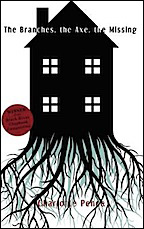 The Branches, The Axe, The Missing
The Branches, The Axe, The Missing
Poetry by Charlotte Pence
Black Lawrence Press, 2012
ISBN-13: 978-0982876671
$9.00; 28pp.
Reviewed by Anne Shaw
“This is the story we keep telling,” writes Charlotte Pence in The Branches, The Axe, The Missing: “How it all falls. / How the small world falls.” The scope of this slim but ambitious volume ranges from personal loss to language and human anthropology. Pence engages with the primal, exploring from different perspectives images of fire and sustenance, of shared existence and isolation. A loose narrative focuses on the loneliness that accompanies acts of voluntary excision, as the protagonist contemplates her decision to break ties both with an abusive father and a partner she never loved.
Pence is at her strongest when she allows her keen powers of observation to come to the fore, as in the book’s opening poem. Finding an iced branch fallen in her driveway:
Her hands slide down wet-slime of turkey-tail mushrooms in bloom.
She pauses. Decides not to wipe off her hands.
Begins again.
It takes five tugs, a deep drag. The moon seeps through to a shine.
How long has it been since she has done something as fundamental as this?
Here, Pence’s stark and precise details inject the reader directly into the experience. She also demonstrates a masterful sense of the materiality of language, its weight and sound, as when she writes:
Metaphor.
[A man is the thrust of the bird’s breast as it rises from the bay bush.]
Act.
[A spreading of the bird’s wings.
A lifting.
A spreading of the man’s arms.
A stilling.
His feet still on the ground.]
Pence’s fine ear, her sense of language as material, and thematic concerns recall George Oppen’s Of Being Numerous. Unfortunately, the chapbook is weakened by poems that merely summarize well-accepted theories of human anthropology, and its broad range leaves open spaces that seem to require further development. It begs for elaboration into a full-length work; one hopes such a project is under way. In the meantime, Pence has crafted an evocative collection with moments of gleaming detail.
